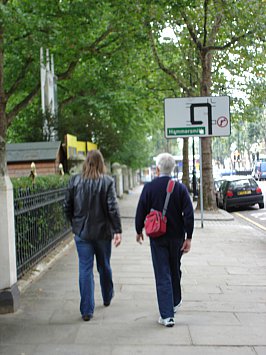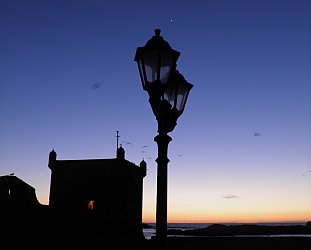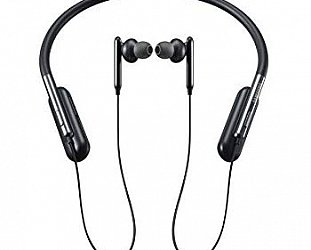Graham Reid | | 4 min read

We were in a crowded post office in Venice when I said to my mother-in-law Sue, "You know the first thing you pack when you travel? Patience."
We needed it that morning. We were sending home unwanted clothes and a few souvenirs. We'd queued to buy the box, queued again to have it weighed and get the necessary paperwork (in duplicate, not to be filled in at the counter), then queued again to pay for the stamps and have it posted.
It took an hour, and all the while the grand exoticism of Venice lay just out of reach.
It was frustrating, but the kind of thing you experience when you travel.
Most often I have travelled alone, sometimes with a partner, but this was the first time I had travelled with in-laws.
Some of my friends, when they heard about this, laughed and said I was courageous. Maybe so, but for six weeks through London, France and Italy, I had the chance to see the world through their eyes. My father-in-law Horst had never been to Europe, and Sue had been once, but only briefly. It was also an opportunity to learn things older people might need to know when travelling, particularly those who haven’t done it before or in a while. Some tips then:
* Before you go, get a thorough medical check-up, including dental. It might even be an idea to get your dentist to give you a prescription for antibiotics which you get filled before you go. Toothache is hell at home, but it's worse in Taiwan or Turin.
* Pack your bag early and try carrying it up a flight of stairs. Still think you need all that stuff? Toss things out. Don't take towels or t-shirts (hotels have towels, you can buy cheap t-shirts anywhere), think in layers of clothing rather than outfits. Thermal underwear is good for colder climates and doesn't take much space.
* One smart outfit is probably enough. Gentlemen, a jacket which can fold up (plus a good shirt and tie), women can wear black pants and a jacket all day and by the addition of a broach and earrings look smart enough for dinner.
* If you think it might occasionally rain where you are going take a small, fold-up umbrella and those cheap plastic coats that come in a tiny bag. An overcoat will weigh you down.
* A suitcase on rollers is essential. Make sure the wheels are sturdy because some streets you'll drag it down will be rough. Cobbles might be quaint but they will rip apart cheap rollers.
* Nothing will ever replace a good pair of walking shoes. Be comfortable -- and sit down at every opportunity, even if it is just one stop on the underground. Rest up, you'll need your energy. Travelling can take it out of you.
* Yes, you should drink water, but don't be a slave to it like those in their 20s. You are older, wiser and know the consequences so . . .
* If you see a toilet, use it whether you think you need to or not. One might be hard to find while wandering through a small Mexican village or when you are fit to burst in a charming old monastery.
* If you are on medication take enough to see you through, and consider this: maybe you might need pills for constipation or (its opposite) if those things have troubled you. Unless you are very good at Chinese or German they might be difficult to get in Beijing or Berlin.
* Make your needs known. If you are tired just say so. Better you do so early than when you are dead on your feet and a long way from the hotel. Pace yourself, and if you feel like lying in bed for half a day just do so. The Tower of London will still be there tomorrow.
* Accept that you won't see everything, so just see what you can. You can always go back in a year or so.
* Ignore beggars. It's a tough one, especially if a woman is carrying an undernourished baby. If you give to her, depending on where you are, be prepared to be surrounded by others with equally undernourished babies. Charity begins at home, so give to credible international organisations in New Zealand and travel with a clear conscience.
* Gentlemen, do you really need a wallet? Especially one which has your local library Card, video club membership and so on? Wallets are cumbersome and obvious. Why not just carry a small card wallet and cash.
* If you are a couple don't let one person carry all the money. If you get separated one of you will have a problem and the other will be worried sick. Always have enough for a cab fare, phone call and some food.
* Carrying cash on the streets? Keep large bills in one place and smaller bills for things like drinks and trinkets in another. Don't flash your big money around.
* Always carry the card from the hotel you are staying in.
* Always carry ID, and that doesn't necessarily mean your passport unless you are intending to change travellers cheques. If you are just out seeing the sights leave the passport at the hotel (in a safe if necessary). Your New Zealand driver's licence is an adequate photo ID and almost universally accepted. Photocopy the important page in your passport and stow it separately in your luggage, it might come in handy if you lose the real thing.
* Consider getting mobile phones or a worldwide SIM card for your own. Useful for booking hotels in advance if you are on the move, or if you get separated. Keep them charged and turned on.
* In hotel rooms don't unpack and put things in drawers or the cupboards, it just increases the chance of leaving them behind. Hang things where you can see them.
* If you have a spare pair of reading glasses, take them. I guess the same goes for false teeth?
* Take photos but don't be a slave to your camera. Better to see the real world than a reduced image of it through a lens.
* If nothing else, learn the local words for "please" and "thank you" (more if you can manage) and use them. Your best efforts, no matter how bad, will be appreciated.
* And remember, people out there in the world do things differently: they may smoke in restaurants and bars (if they are allowed to); waiters may take longer to serve you than you expect; in some places people push past rather than form a queue, and don't expect to find the meals you would eat at home at the time you would eat them.
Be flexible, if in doubt do what the locals do, keep a sense of humour, and smile.
Take reasonable risks with food and adventures, make the most of the rare opportunity, and enjoy yourself.
But know this: posting a box in Italy -- or Vietnam -- can take an astonishingly long time. So pack patience.
Was it courageous of me to travel with my in-laws? Maybe. But in retrospect, given how arduous travel can be and that this was a long haul for them through unfamiliar territory, I think they were the courageous ones.
They did it, loved it, and are planning more travel soon.
"Result!" as the soccer fans say.






post a comment